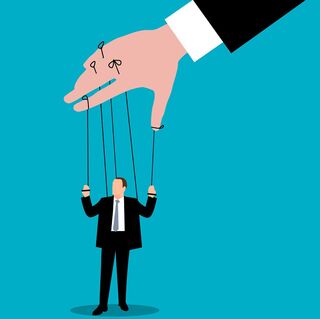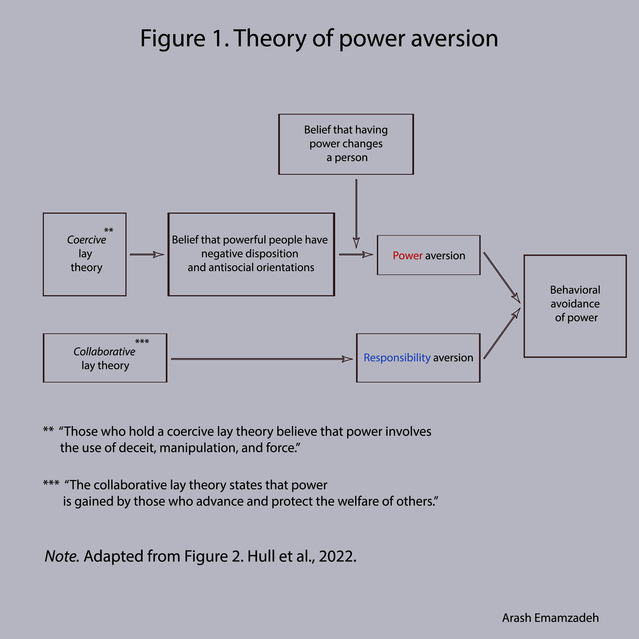Fear
Two Ways You Might Be Disempowering Yourself
Exploring a new theory of power aversion.
Posted March 15, 2022 Reviewed by Vanessa Lancaster
Key points
- It is commonly assumed that everyone desires power, but this is not always true.
- Power aversion may be related to fearing responsibility and causing harm, leading to negative feelings like guilt.
- Power avoidance is also related to a negative view of powerful people and the belief that power can change us for the worse.

Power is a great motivator and is often associated with better mental health and well-being. Indeed, empowerment is a primary goal of helping professions (e.g., psychotherapy, social work).
But is the assumption that everybody wants more power true? Might some be uncomfortable with more power or afraid of it? Might they say no to opportunities for empowerment, or even behave in ways that disempower themselves?
Yes, according to a recent paper by Hull and colleagues, published in the March issue of Journal of Applied Social Psychology.
Before discussing the author’s theory of power aversion, let me clarify what is meant by power.
What is power?
In social relationships, power refers to unequal control over important resources (e.g., status, wealth). For instance, in the A–B relationship, Person A holds power if he/she can give (or take away from) Person B something of value.
There are six bases of power:
- Reward power (i.e., the ability to reward)
- Coercive power (i.e., the ability to punish)
- Legitimate power (i.e., having the right to influence another)
- Expert power (i.e., being knowledgeable)
- Informational power (e.g., persuasiveness)
- Referent power (e.g., charisma)
People often spend much time and effort to become more powerful. For instance, they work on improving their political skills, learning impression management tactics, strengthening their social network, etc.
For some, however, the goal of gaining power is not motivating. Let us look at the reasons why.
Avoidance of Power and Responsibility
It is natural to assume we all want more power, particularly when the goal is controlling one’s own outcomes. Simply put, almost everybody wants personal power and autonomy—to fulfill goals, become happier, or maximize pleasure.
However, when we talk about power, we typically also mean social power, which entails having control over others. And that can be aversive to some. Why?
Possibly because these individuals tend to focus on responsibilities (as opposed to freedoms or opportunities) associated with greater power.
Furthermore, because they fear failing in their responsibilities.
After all, power-holders are required to make consequential decisions—such as decisions about the distribution of resources—which will benefit certain groups and harm others.
In summary, power aversion may be related to avoidance of responsibility (i.e., responsibility aversion) and fear of causing harm.
Avoidance of Power and Coercion
Another reason for power aversion involves people’s lay theories about the nature of power.
One lay theory assumes power is inherently collaborative (e.g., supports common goals, protects public welfare), but another lay theory assumes power is coercive, meaning it is associated with domination, aggression, deceit, threats, exploitation, and forceful imposition of one’s will.
The coercive view suggests manipulation and force are necessary to rise to power and stay in power. This view is supported by many examples of powerful people behaving in cold, selfish ways, unconcerned with justice or morals as they mistreat others (e.g., engage in gaslighting, commit sexual abuse).
Those who hold the coercive theory may also believe “power corrupts.” Specifically, they fear power could as easily change their own personality, making them cold, narcissistic, unjust, and indifferent to suffering.
Such concerns are legitimate. Nevertheless, while it is true that coercive power is associated with self-serving and harmful behavior, this is not so for power in general. Power simply increases action tendencies for both antisocial and prosocial behaviors.
Furthermore, just as power might correlate with negative behaviors, such as aggression, so might powerlessness.
A New Theory of Power Aversion
Putting it all together, Hull et al. propose a new theory of power aversion. One path to power aversion, the theory argues, involves the coercive lay theory. Specifically, a person’s belief that:
- Powerful people have a negative disposition (selfish, cold) and an antisocial orientation (immoral, unjust).
- One’s own disposition and social orientation would change for the worse if given power.
Another path to avoidance of power, the theory submits, involves the collaborative lay theory of power. In particular, a person:
- Assuming power holders have major responsibilities and are obligated to support the welfare of others.
- Feeling uncomfortable with the responsibility of protecting people’s welfare and worrying about potentially causing harm.
See Figure 1.

Takeaway
The ultimate solution to many societal ills—like prejudice, discrimination, and abuse (e.g., intimate partner violence, sexism, racism)—is empowering the disempowered and helping victims have more control over their lives.
Everybody wants power (at least a little). After all, power is associated with many positive outcomes, like freedom, autonomy, control, pleasure, happiness, well-being, and authenticity.
But not everyone desires more power or social power.
And this aversion may have to do with conceptualizations of power (as responsibilities vs. opportunities), views of powerful people (e.g., as callous vs. caring), assumptions regarding the effects of power (e.g., promoting hypocrisy vs. authenticity), and confidence in one’s ability to handle the responsibilities that come with greater influence and authority.
Questions About Your Relationship With Power
Here are some questions to help you gain clarity about your relationship with power:
- What thoughts or feelings come to mind when you hear the word power?
- Does power mean opportunities or responsibilities?
- Are you afraid of responsibilities associated with greater power—of making decisions that may harm others and of feeling guilt or shame?
- When you think of “powerful people,” do you imagine someone possessing negative or positive traits (e.g., insensitive vs. caring)?
- Do you fear power will change your personality negatively (e.g., make you less sympathetic and compassionate)?
Fear of power, especially coercive power, is understandable, especially if you have experienced abuse or been abusive. Or if you have pondered potential abuses of power by political figures.
Nevertheless, we need to remember that power is not inherently bad and may be used to accomplish good. As Gandhi said, “Our anger controlled can be transmuted into a power that can move the world.”




